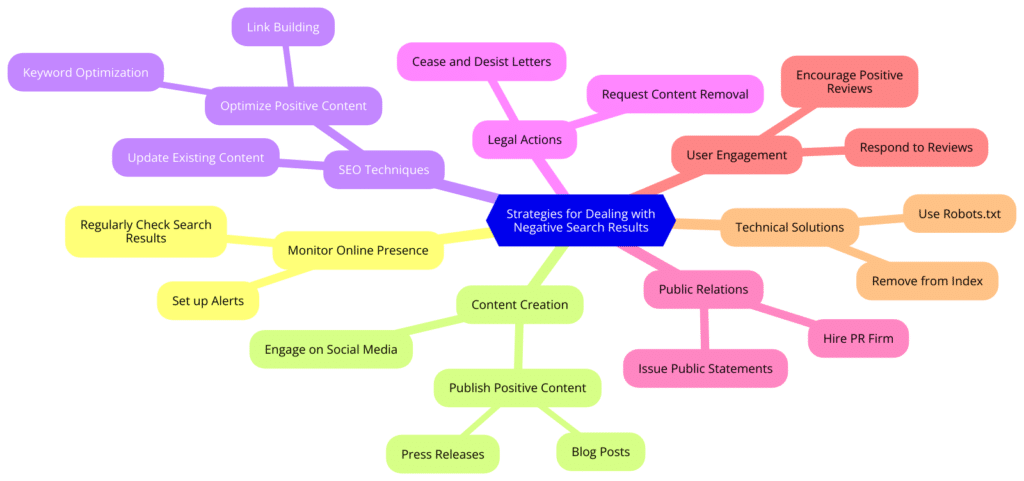How to get negative search results removed
Major search engines like Google, Bing, DuckDuckGo, etc. index a vast amount of information from the internet, and unfortunately, this can include negative information about individuals or businesses. Here are some types of negative information that can appear in search results and damage the online reputation of individuals and businesses.
What types of negative search results can be removed?
- Defamatory content: This might include false information designed to harm a person’s reputation, such as untrue statements or allegations.
- Negative reviews or complaints: For businesses, negative reviews or complaints from customers can be damaging. Even for individuals, reviews or comments on professional or social sites can sometimes be negative and hurtful.
- Legal issues: Information about legal troubles or convictions can often be found online, especially if the matter was reported in the news.
- Unflattering news stories: Media coverage about a person or a business is often picked up by search engines. If the coverage is negative, it can harm the person’s or business’s reputation.
- Personal information: Sometimes, personal information that a person would rather keep private can be found online. This might include address details, phone numbers, or other sensitive information.
- Old or outdated information: Information that is no longer relevant or accurate can still appear in search results and potentially create a negative impression, damaging the reputations of people and businesses.
- Negative social media content: Negative posts, images or videos on social media platforms can also appear in search results.
- Inappropriate content: This could include anything from embarrassing photos or videos to explicit content, such as revenge pornography, or offensive material.
- Hacked content: If your website or account has been hacked and altered with malicious intent, that negative information might appear in search results.
Remember, managing your online reputation is crucial in this digital age. Regularly check what information about you or your business is available online and take action if necessary to protect your internet reputation.
Strategies to Remove Negative Search Results
Removing negative search results from the Internet can be a challenging task since it often involves dealing with multiple entities and laws that may vary from country to country. Here are some general steps you might consider:
- Contact the website owner: If the information is posted on a specific website, you can try reaching out to the owner or webmaster of that site to request removal of the content. Be polite and clear in your communication about why you want the information removed.
- Contact the search engine: If the website owner doesn’t respond or refuses to remove the content, you can appeal to the search engine itself. Google, for example, has a policy for removing certain types of sensitive personal information. However, keep in mind that search engines don’t own the data on the web, they just index it, so they typically remove listings only in specific circumstances, such as when the content is illegal or violates their policies.
- Legal action: If the content is defamatory, false, or violates any laws (such as copyright laws), you may consider seeking legal advice. In some cases, you might be able to have a lawyer issue a cease-and-desist order or even take the matter to court.
- Online reputation management: Sometimes, it’s not possible to get content removed, especially if it’s not illegal or against a site’s policies. In these cases, you might consider online reputation management (ORM). This involves strategies to promote positive or neutral content about you or your company, with the goal of pushing the negative search results lower in the rankings so they’re less likely to be seen. This can be done through creating new content, optimizing your social media profiles, or even hiring an ORM company to help.
- Right to be forgotten: In the European Union, you can invoke the “Right to Be Forgotten” law, which is designed to allow individuals to request the deletion of personal information. If you’re not in the EU, this law may not apply, but it might be worth investigating whether there are similar laws in your country.
Remember that the process can take time, and there’s no guarantee of success. This is especially true without the help of a professional online reputation management company. Always be careful about who you share your personal information with, and be proactive in managing your online reputation to prevent negative information from appearing in the first place.
Other strategies to deal with negative search results
The diagram below shows a mindmap for visualizing the different strategies for dealing with negative search engine results explained below.

SEO Techniques
SEO techniques are essential for managing and mitigating negative search results about a brand or individual. One key approach is optimizing positive content, such as creating high-quality, relevant blog posts and articles that can rank higher in search results than negative content. This involves conducting keyword research to identify terms that potential customers are searching for and integrating these keywords naturally into your content. Additionally, building backlinks from reputable sites can boost the authority of your positive content, making it more likely to appear higher in search results. Regularly updating and refreshing your existing content to keep it relevant and engaging can also help improve its search ranking. By strategically using SEO techniques, you can suppress negative search results and enhance the online reputation of your brand.
Optimize Positive Content
Optimizing positive content means enhancing the quality and relevance of favorable information about your brand. This can include improving the SEO of positive articles, reviews, and testimonials so that they appear prominently in search engine results, thereby overshadowing negative content.
Keyword Optimization
Keyword optimization involves researching, analyzing, and selecting the best keywords to target in your content. This process ensures that your website appears in search engine results for relevant queries, improving its visibility and attracting the right audience.
Link Building
Link building is the practice of acquiring hyperlinks from other websites to your own. These links act as endorsements, signaling to search engines that your content is valuable and trustworthy, which can boost your site’s ranking in search results.
Update Existing Content
Regularly updating existing content ensures that it remains accurate, relevant, and useful to readers. This can improve your website’s SEO by signaling to search engines that your content is fresh and up-to-date, which can lead to higher rankings.
Legal Actions to Deal with Negative Search Results
If the content is defamatory, false, or violates any laws (such as copyright laws), you may consider seeking legal advice. In some cases, you might be able to have a lawyer issue a cease-and-desist order or even take the matter to court.
Cease and Desist Letters
Cease and desist letters are legal documents sent to individuals or entities to stop alleged illegal activities, such as defamation. These letters can be used to request the removal of negative or false information from the internet, providing a formal method to protect your reputation.
Request Content Removal
Requesting content removal involves directly contacting webmasters or administrators of websites to ask for the deletion of harmful or false information. This approach can be effective for removing defamatory or misleading content that damages your online reputation.
User Engagement
User engagement is vital for managing and enhancing your online reputation. By actively interacting with your audience, you can build a loyal community and improve your brand image. Encouraging positive reviews is a key aspect of user engagement; satisfied customers can share their experiences, helping to counteract any negative content. Responding to reviews, both positive and negative, shows that you value feedback and are committed to addressing concerns. This transparency fosters trust and demonstrates your dedication to customer satisfaction, ultimately boosting your online reputation and visibility.
Encourage Positive Reviews
Encouraging positive reviews involves actively seeking out satisfied customers to share their experiences online. Positive reviews can improve your brand’s reputation and push negative reviews down in search engine results, as well as increase trust and credibility with potential customers.
Respond to Reviews
Responding to reviews, both positive and negative, demonstrates that you value customer feedback and are committed to addressing concerns. This engagement can improve customer relations and show potential clients that you are responsive and responsible, enhancing your reputation.
Technical solutions
Technical solutions for managing negative search results involve using tools and techniques to control how search engines index and display content. One common method is using the robots.txt file to prevent search engines from crawling specific pages on your site. Another technique is to utilize the “noindex” meta tag to ensure that certain pages do not appear in search results. Additionally, removing outdated or harmful content through tools like Google Search Console can help clean up your online presence. These technical measures can effectively manage and suppress negative information about your brand.
Use Robots.txt
Using Robots.txt is a method to control how search engines crawl and index your site. By configuring the Robots.txt file, you can block search engines from accessing certain pages or content, which can help manage what information appears in search results.
Remove from Index
Removing content from an index involves asking search engines to de-index certain pages. This can be done through tools like Google Search Console, which can help ensure that outdated or harmful information does not appear in search results.
Public Relations
Public relations (PR) strategies are crucial for managing a brand’s image and countering negative search results. PR involves crafting and disseminating positive stories about your brand through press releases, media coverage, and public statements. By highlighting achievements, new developments, and community involvement, PR efforts can generate favorable media coverage that overshadows negative content. Additionally, engaging with the media and influencers can help control the narrative and improve public perception. Effective PR can rebuild trust and enhance the overall reputation of a brand, mitigating the impact of negative search results.
Issue Public Statements
Issuing public statements can help address negative information head-on. By providing a clear, honest response, you can control the narrative, clarify misunderstandings, and show transparency, which can mitigate the impact of negative content.
Hire PR Firm
Hiring a public relations (PR) firm can provide professional assistance in managing your reputation. PR firms have expertise in crafting strategic communication plans, handling crises, and promoting positive stories to improve public perception and counteract negative information.
Content Creation
Content creation is a powerful tool for managing negative search results. By consistently producing high-quality, relevant content, you can push down negative information in search engine rankings. This includes writing blog posts, articles, and press releases that highlight positive aspects of your brand. Creating engaging content such as videos, infographics, and social media posts can also attract attention and improve your online presence. Regularly updating your website with fresh content signals to search engines that your site is active and relevant, helping to boost the visibility of positive information and suppress negative search results.
Engage on Social Media
Engaging on social media involves actively participating in conversations and sharing content on platforms like Facebook, Twitter, and LinkedIn. This can increase the visibility of positive information and demonstrate your commitment to transparency and customer engagement.
Publish Positive Content
Publishing positive content, such as success stories, case studies, and testimonials, can help overshadow negative search results. High-quality, engaging content can rank well in search engines and provide a more balanced view of your brand.
Press Releases
Press releases are official statements issued to the media to announce significant events or developments. They can help generate positive media coverage and improve your online reputation by highlighting achievements and positive news about your brand.
Blog Posts
Creating and publishing blog posts on your website can help address negative information and improve SEO. By regularly producing informative and engaging content, you can attract more visitors, increase your site’s authority, and push negative content lower in search results.
Monitor Online Presence
Monitoring your online presence involves keeping track of what is being said about you or your brand across various platforms. This includes social media, review sites, forums, and news articles. Regular monitoring helps you stay aware of your reputation and address issues promptly.
Regularly Check Search Results
Regularly checking search results helps you stay informed about what information is available about your brand online. This proactive approach allows you to quickly address any negative content and take steps to improve your online reputation.
Set up Alerts
Setting up alerts, such as Google Alerts, can notify you whenever new content is published about your brand. This real-time monitoring enables you to respond quickly to any negative information and manage your reputation more effectively.
FAQ: Dealing with Negative Search Results
Negative search results are online content that portrays a person or business unfavorably, potentially harming their reputation and public image.
Negative search results can lead to loss of trust, reduced customer confidence, and potential financial losses, affecting both personal and professional aspects.
Effective strategies include keyword optimization, creating and optimizing positive content, engaging with users, employing technical solutions, and leveraging public relations efforts.
Engaging with users by encouraging positive reviews and responding to feedback shows that you value customer input and are committed to addressing concerns, which can improve your online reputation.
Technical solutions include using robots.txt to control search engine indexing, removing outdated content, and employing noindex tags to prevent specific pages from appearing in search results.
Public relations strategies, such as issuing press releases and public statements, can generate positive media coverage, counteracting negative information and improving public perception.
Creating high-quality, relevant content helps push down negative search results in search engine rankings and enhances your overall online reputation.
Legal actions like sending cease and desist letters or requesting content removal from webmasters can help address and remove harmful, false information.
Regularly checking search results and setting up alerts can help you stay informed about new content related to your brand, allowing you to quickly address any negative information.





